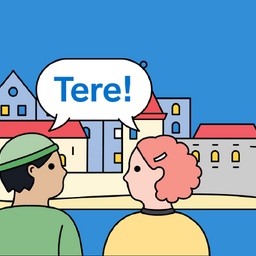Haridusministeerium teeb uuringut. Nad tahavad teada, kas on
õige rahastada erakooli
, kus
õpetatakse vene keeles
. Eesti riik ei luba ei toeta vene keeles õpetamist
munitsipaalkoolides
. Seal õpetatakse eesti keeles. Kuid erakoolides on vene keeles õpetamine lubatud ja riik seda rahastab.
õige rahastada erakooli
Tõlge fraasile: õige rahastada erakooli
EN
appropriate to fund a private school
õpetatakse vene keeles
Tõlge fraasile: õpetatakse vene keeles
EN
taught in Russian
munitsipaalkoolides
Tõlge fraasile: munitsipaalkoolides
EN
municipal schools
Haridusminister Kristina Kallas rääkis, et erakoolis vene keeles õpetamine ei ole keelatud. Kuid tekib küsimus, kas see on mõistlik. Ta ütles, et nad analüüsivad seda küsimust. Näiteks Narva õigeusu gümnaasiumis on
õpilaste arv kasvanud
. Tõenäoliselt on õpilased tulnud sinna
munitsipaalkoolides
t, kus vene keeles õpetamine ei ole lubatud.
õpilaste arv kasvanud
Tõlge fraasile: õpilaste arv kasvanud
EN
the number of students has increased
munitsipaalkoolides
Tõlge fraasile: munitsipaalkoolides
EN
municipal schools
Minister lisas, et haridusministeerium vaatab, kui suur on liikumine
venekeelsetesse erakoolidesse
. Kallas ei osanud öelda, kas probleem on peamiselt Narvas või ka Tallinnas. Signaalid tulid Narvast, kuid
uuring on veel pooleli
.
venekeelsetesse erakoolidesse
Tõlge fraasile: venekeelsetesse erakoolidesse
EN
to Russian-speaking private schools
uuring on veel pooleli
Tõlge fraasile: uuring on veel pooleli
EN
the study is still ongoing
Eestis on kümme venekeelset erakooli. Sellel õppeaastal õpib nendes koolides 903 õpilast. Eelmisel õppeaastal oli õpilasi 941 ja aasta varem 1023. Andmed on veel esialgsed, sest koolidel oli tähtaeg andmeid esitada 10. novembril. Andmeid pole veel täielikult kontrollitud.
Haridusministeeriumi kommunikatsiooninõunik Aire Kolk ütles, et analüüs on veel käimas. Konkreetsed otsused sõltuvad analüüsi lõpptulemustest.
Eestikeelse õppe juurde ülemineku protsess algas lasteaedades ja algkoolides eelmisel aastal. See
protsess jätkub järk-järgult
ja lõpeb 2030. aastal.
protsess jätkub järk-järgult
Tõlge fraasile: protsess jätkub järk-järgult
EN
the process continues gradually
The Ministry of Education is conducting a study. They want to know whether it is appropriate to fund private schools where teaching is conducted in Russian. The Estonian state does not allow or support teaching in Russian in municipal schools. There, teaching is conducted in Estonian. However, in private schools, teaching in Russian is permitted, and the state funds it.
Education Minister Kristina Kallas stated that teaching in Russian in private schools is not prohibited. However, the question arises whether it is reasonable. She said they are analyzing this issue. For example, the number of students at the Narva Orthodox Gymnasium has increased. It is likely that students have moved there from municipal schools where teaching in Russian is not allowed.
The minister added that the Ministry of Education is looking into the extent of the movement to Russian-language private schools. Kallas could not say whether the problem is mainly in Narva or also in Tallinn. Signals came from Narva, but the study is still ongoing.
There are ten Russian-language private schools in Estonia. This academic year, 903 students are studying in these schools. Last academic year, there were 941 students, and the year before that, 1023. The data is still preliminary, as schools had a deadline to submit data on November 10th. The data has not yet been fully verified.
Aire Kolk, the communication advisor at the Ministry of Education, said that the analysis is still ongoing. Specific decisions will depend on the final results of the analysis.
The transition to Estonian-language education began in kindergartens and elementary schools last year. This process will continue gradually and will be completed by 2030.

